Ever feel like you’re chasing shadows in your sales job?
Day after day, the endless cycle of calls, emails, and follow-ups feels less like selling and more like running on a treadmill. You’re hustling hard but somehow not gaining any real ground.
You’ve heard whispers about artificial intelligence changing the game for sales professionals, and how AI sales tools are turning average sales reps into rockstars overnight. But amidst all this chatter, one question lingers:
“How can I use AI in sales?”
This isn’t some distant future we’re talking about; these changes are happening here and now. If used correctly, AI has the potential to revolutionize everything from lead scoring to customer interactions and even sales forecasting.
Let’s dive deep into how can I use AI in sales with us so you can boost your team’s performance today.
Table Of Contents:
- The Role of AI in Sales
- The Impact of Automation on Sales Productivity
- Leveraging Conversation Intelligence Tools
- Sales Enablement Automation
- Making Data-Driven Decisions with AI
- Generative AI: How Can I Use AI in Sales?
- The Future of Sales Forecasting and Pipeline Analysis
- FAQs – How Can I Use AI in Sales
- Conclusion
The Role of AI in Sales
If you’ve ever been curious about how AI is transforming sales, now’s the time to become informed. But first, let’s consider a key statistic: only 37% of all sales organizations currently use AI in their processes.
The power of AI lies in its ability to learn and adapt over time, just like a seasoned sales rep would do. However, unlike humans who need breaks and have limits on processing large datasets, machine learning algorithms can tirelessly work around the clock analyzing sales analytics and producing valuable insights for sales teams.
This isn’t merely speculation — more than half of high-performing sales teams are already leveraging AI according to a HubSpot survey.
AI as an Essential Sales Tool
The realm where AI truly shines is automation. It streamlines repetitive tasks such as lead scoring or customer outreach campaigns so that your team can focus on strategic planning instead. This has transformative effects not just on job satisfaction but also enhances overall team performance.
Sales Forecasting with Precision
Predictive analytics forms another cornerstone where AI proves beneficial in sales. AI insights can help a sales team forecast future revenues based on past patterns and identify potential pain points early through pipeline management tools.
Sales Engagement Through Personalization AI
Generative AI can also transform customer interactions through personalization – from tailoring marketing messages right down to enhancing product recommendations using real-time data insights gathered from customers’ buying behaviors. With personalized AI, each interaction is unique and valued which directly impacts the closing of deals.
Despite these benefits, AI adoption in sales isn’t as widespread yet. But considering the speed at which it’s changing sales landscapes globally and enhancing both customer experiences and organizational effectiveness, that’s expected to change soon.
AI is more than just a tech gimmick; it can revolutionize your sales tactics, making them sharper and more effective than ever.
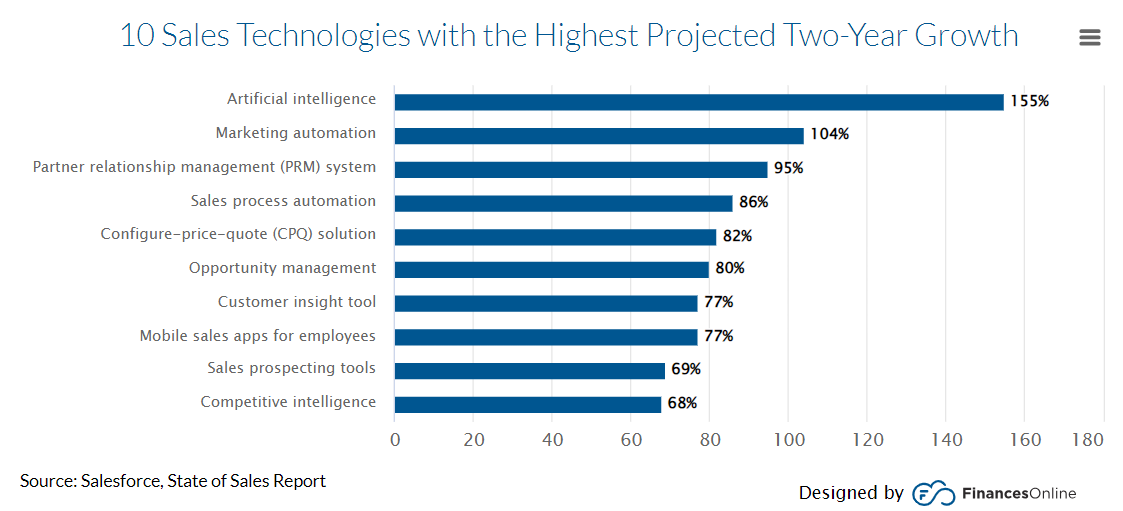
Source: Finances Online
The Impact of Automation on Sales Productivity
Let’s talk about how automation is reshaping the sales landscape.
A staggering 33% of an inside sales rep’s time is spent actively selling, but imagine what could be achieved if we reduce administrative tasks? With AI tools at our disposal, up to 30% of these repetitive tasks can be automated.
Sales reps often find themselves drowning in data entry work and tracking down leads. But with automated sales technology stepping into play, this workload can dramatically decrease.
We’re talking about automating everything from sending follow-up emails to updating CRM records. The saved hours translate directly into more opportunities for strategic planning and building stronger customer relationships—areas where a human touch truly matters.
This doesn’t mean replacing humans with machines though. Rather than seeing automation as a threat, consider it as help that allows you to focus on what really counts: connecting with customers and closing deals.
Machine Learning and Advanced Data Enrichment Tools
In addition to streamlining routine tasks, advanced data enrichment tools pave the way for sophisticated lead-scoring models. Powered by machine learning algorithms, they identify key moments during sales outreach campaigns that might need your immediate attention or action.
Data is the lifeblood of modern sales organizations. Without the ability to interpret and apply data effectively, raw information is not particularly useful.
An advanced data enrichment tool uses machine learning algorithms to cleanse, transform, and enrich large datasets, making them more useful for analysis by your AI tools or even your human analysts.
An enriched dataset allows AI solutions to produce insights that lead directly to improved sales performance.
A notable benefit lies in improving outreach campaigns — having rich customer profiles lets you tailor messages accurately, enhancing engagement rates dramatically.
Another perk includes being able to predict key moments in a sales cycle when customers are most likely ready to close deals or need some extra nurturing based on their interaction history.
Beyond helping identify pain points quicker than traditional methods, these enriched datasets also help refine pipeline management strategies and enhance job satisfaction among sales representatives who now have better context while interacting with leads thanks to accurate real-time data provided by such tools.
Fuel Your Sales Performance With Real-Time, High-Quality Data
Instead of making educated guesses based on limited information, you now have access to real-time data. You can accurately prioritize leads based on a multitude of factors such as buying behavior, interaction history, and more.
Moreover, the ability to glean insights from large datasets allows sales professionals to predict trends and anticipate customer needs even before they do. Now that’s what we call staying ahead of the game.
So, integrating sales AI into your daily operations is a game changer. It can significantly boost the efficiency of your sales processes and give you an edge over competitors.
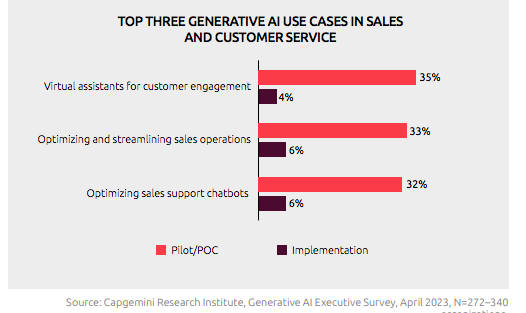
Leveraging Conversation Intelligence Tools
When it comes to sales, conversation is key. But let’s add a little twist: What if your conversations could be smarter? Enter the world of sales intelligence tools.
These AI-powered marvels can transform how you engage with customers. It’s like having an extra pair of ears that never miss any crucial detail in a customer interaction.
Enhancing Customer Interactions with AI
The magic lies in how these tools analyze and optimize interactions. They listen to your sales calls, spot patterns, understand customer sentiments, and even offer insights on how well you’re addressing pain points.
No more guessing games about what works or doesn’t; everything becomes data-driven with artificial intelligence. The impact is clear: improved outcomes for both sales reps and customers alike.
This isn’t just speculation either; a whopping 82% of respondents in a recent Deloitte survey said they strongly believe AI would enhance their job performance and satisfaction. Quite impressive.
Baking Conversational Insights into Your Sales Process
So how can I use AI in sales conversations?
In practical terms, these insights can help tailor outreach messages better suited to each prospect’s needs — no two people are alike after all. Plus, when applied effectively over time across various customer interactions, such targeted messaging can lead to enhanced engagement rates.
If we look at pipeline management from another angle using machine learning algorithms combined with large datasets collected from past calls, we get highly accurate predictions about deal closures too. All this while reducing the time spent on administrative tasks.
And here’s another thing: This approach isn’t just about enhancing sales performance, it also changes how you measure and improve job satisfaction within your team. After all, when a sales rep can close deals more effectively and provide value to their customers – that’s a win-win.
Sales Enablement Automation
Sales enablement automation streamlines processes and improves efficiency within your sales team.
No longer do your reps need to juggle multiple tasks at once. This shift towards automated outreach campaigns not only reduces manual work but also leads to improved job satisfaction among your representatives.
But it’s not only about simplifying matters; the goal is to make them better too. By using advanced machine learning algorithms, these tools can analyze large datasets from various sources such as existing sales reports or customer feedback surveys. The result? Key insights that drive smarter decision-making across all levels of an organization.
Data enrichment tools go one step further than traditional data analysis methods because they use real-time data rather than historical information. These smart systems are capable of providing valuable suggestions tailored specifically toward individual customers’ pain points or preferences – leading directly to increased conversion rates and revenue growth.
Making Data-Driven Decisions with AI
As we look towards the future of sales, data-driven decisions stand at the forefront. AI is a crucial element for realizing data-driven decisions in the upcoming future of sales.
Boosting Productivity with Data-Driven Decisions
Data forms an integral part of our decision-making process. With more and more large datasets available to us, gleaning valuable insights has become a challenge for many businesses.
Luckily, AI comes to the rescue. Through machine learning algorithms and advanced analytics, AI tools can sift through these massive amounts of information in no time.
The result? Sales teams get crucial insights that allow them to streamline their processes and boost productivity.
Gartner predicts that 65% of B2B sales organizations will transition from intuition-based to data-driven decision-making by 2026.
This shift to data-driven decision-making is beneficial for sales reps who can now reclaim up to 27% of their time previously spent manually logging data.
These changes are not just about efficiency but also effectiveness: getting accurate real-time data lets you close deals faster while ensuring customer satisfaction along the way.
Generative AI: How Can I Use AI in Sales?
Generative AI can be a powerful tool in the field of sales, offering innovative ways to enhance customer engagement, streamline sales processes, and create more personalized experiences.
Here are some examples of how AI prompts could be used for various sales tasks. To demonstrate, I used these prompts with BrandWell’s AIMEE chatbot.
Product Descriptions
Prompt: “Create a captivating and detailed product description for a new line of athletic footwear designed for trail running, emphasizing its unique features and benefits.”
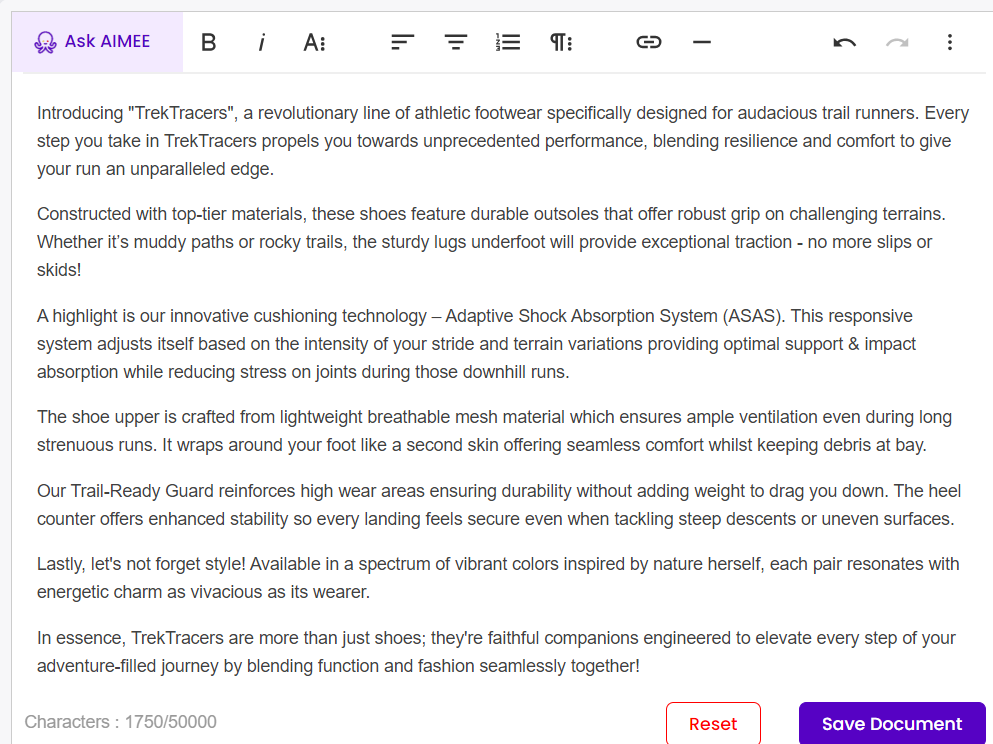
Sales Email Drafting
Prompt: “Draft a persuasive and personalized sales email for a B2B client, focusing on our new project management software, tailored to the client’s specific industry and needs.”

Sales Scripts
Prompt: “Develop a conversational sales script for an inbound call center focusing on upselling premium cable TV packages, including potential customer objections and responses.”
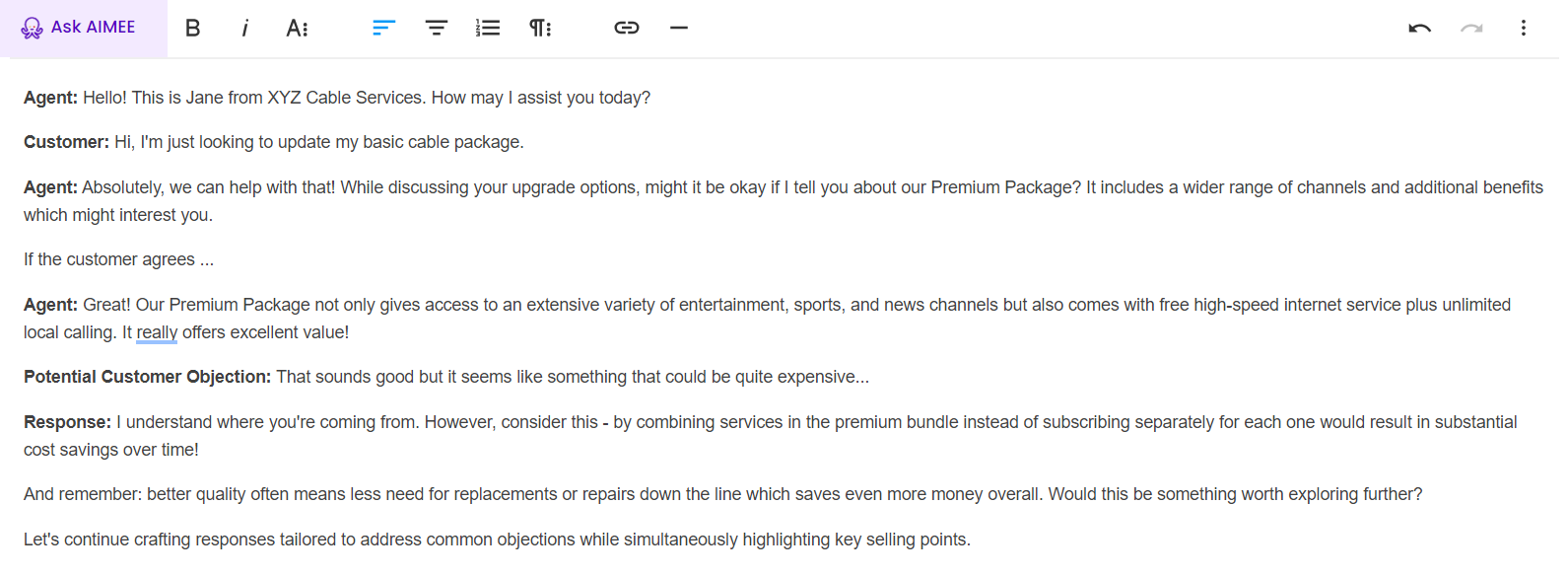
Customer Persona Creation
Prompt: “Create a detailed customer persona for a luxury watch brand, including demographics, psychographics, purchasing habits, and key motivators for buying.”
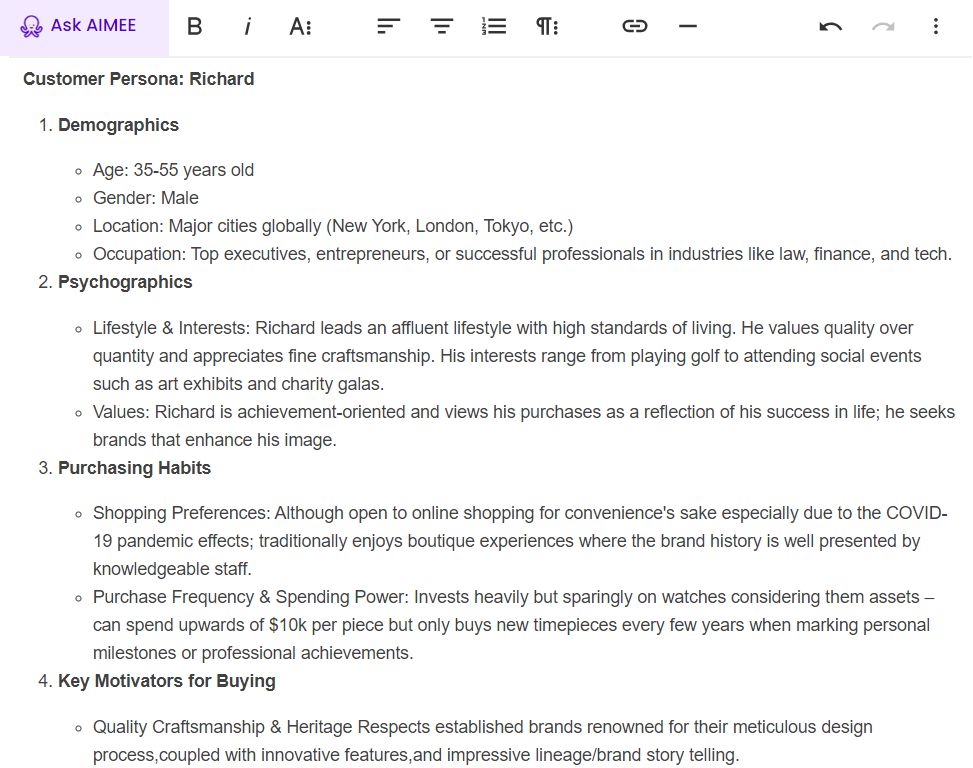
Ad Copy
Prompt: “Write a series of engaging and targeted social media ad copies for a new fitness app, aimed at young professionals in urban areas.”
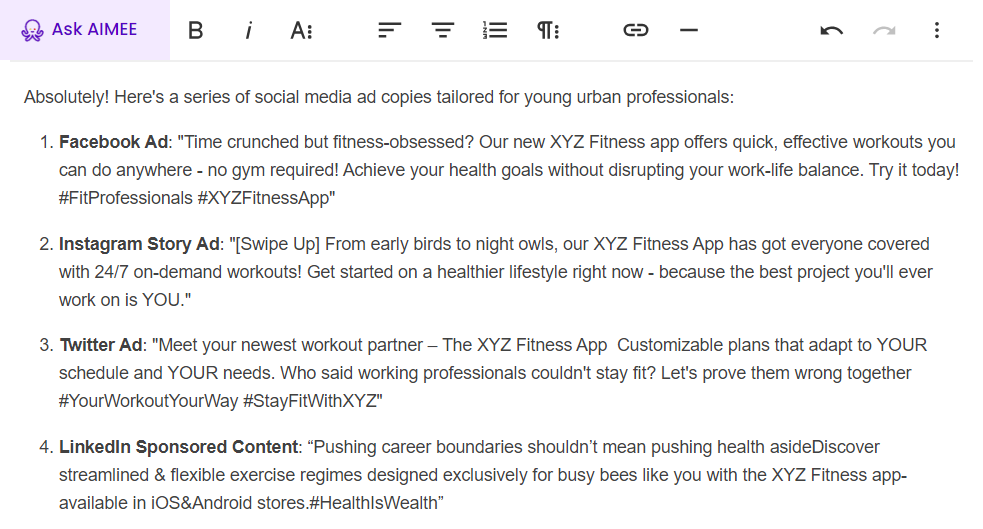
Proposal Customization
Prompt: “Customize a sales proposal for a corporate client interested in our cloud storage solutions, highlighting specific features that align with their data security requirements.”
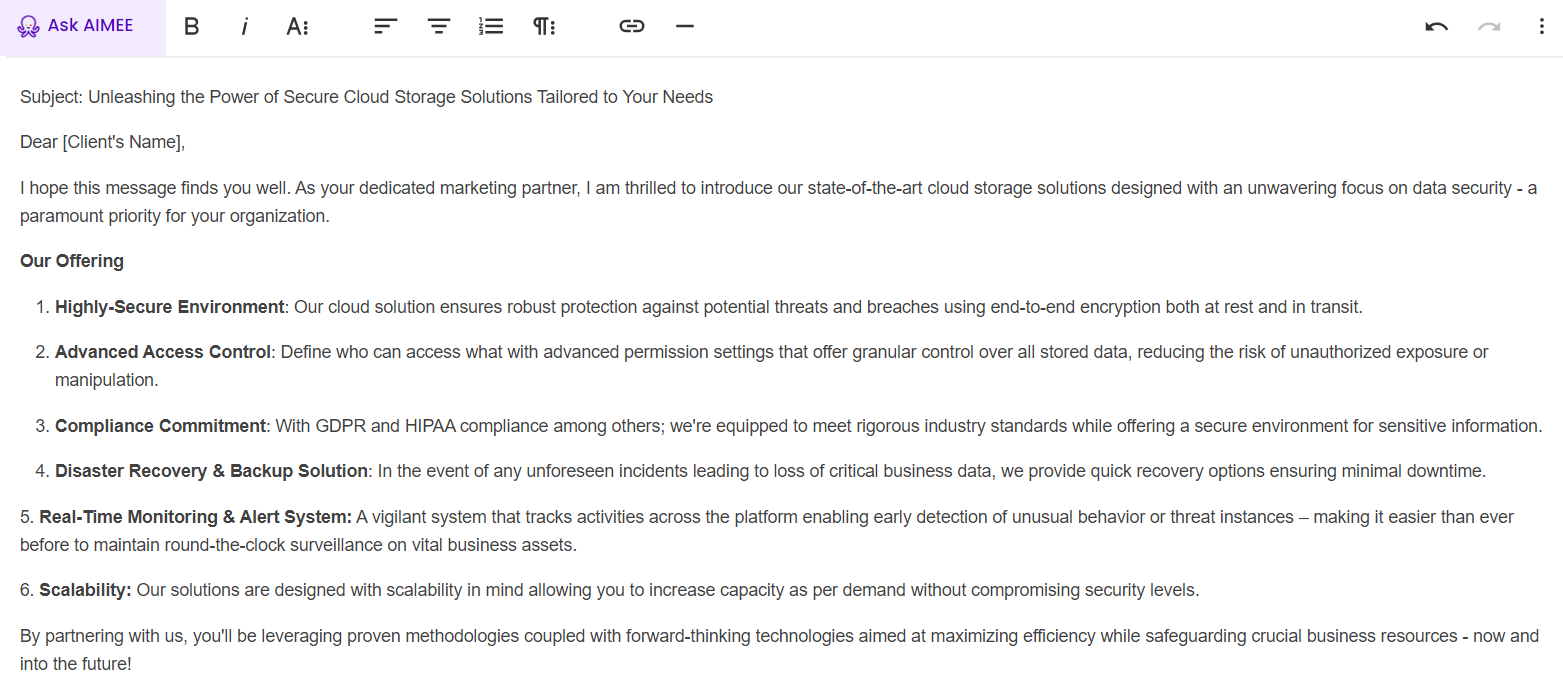
Client Follow-up Reminders
Prompt: “Generate a weekly schedule of follow-up reminders for clients who showed interest in our services during a recent trade show.”
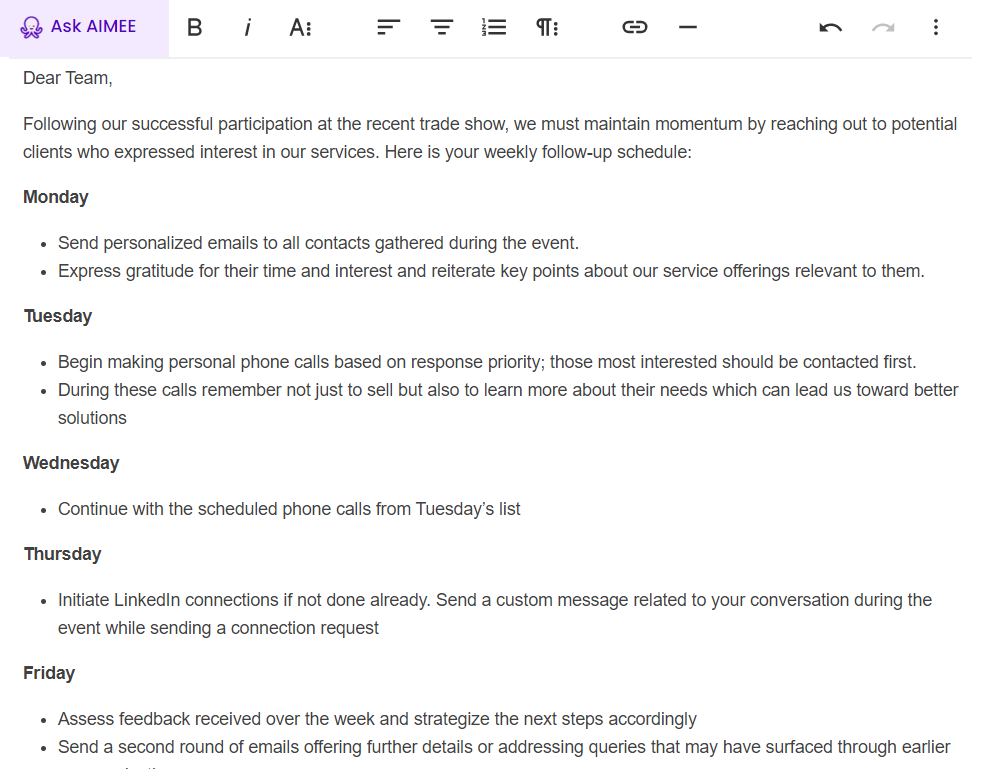
Sales Data Analysis
Prompt: “Analyze sales data from the last quarter to identify patterns in customer buying behavior, popular products, and regions with the highest sales.”
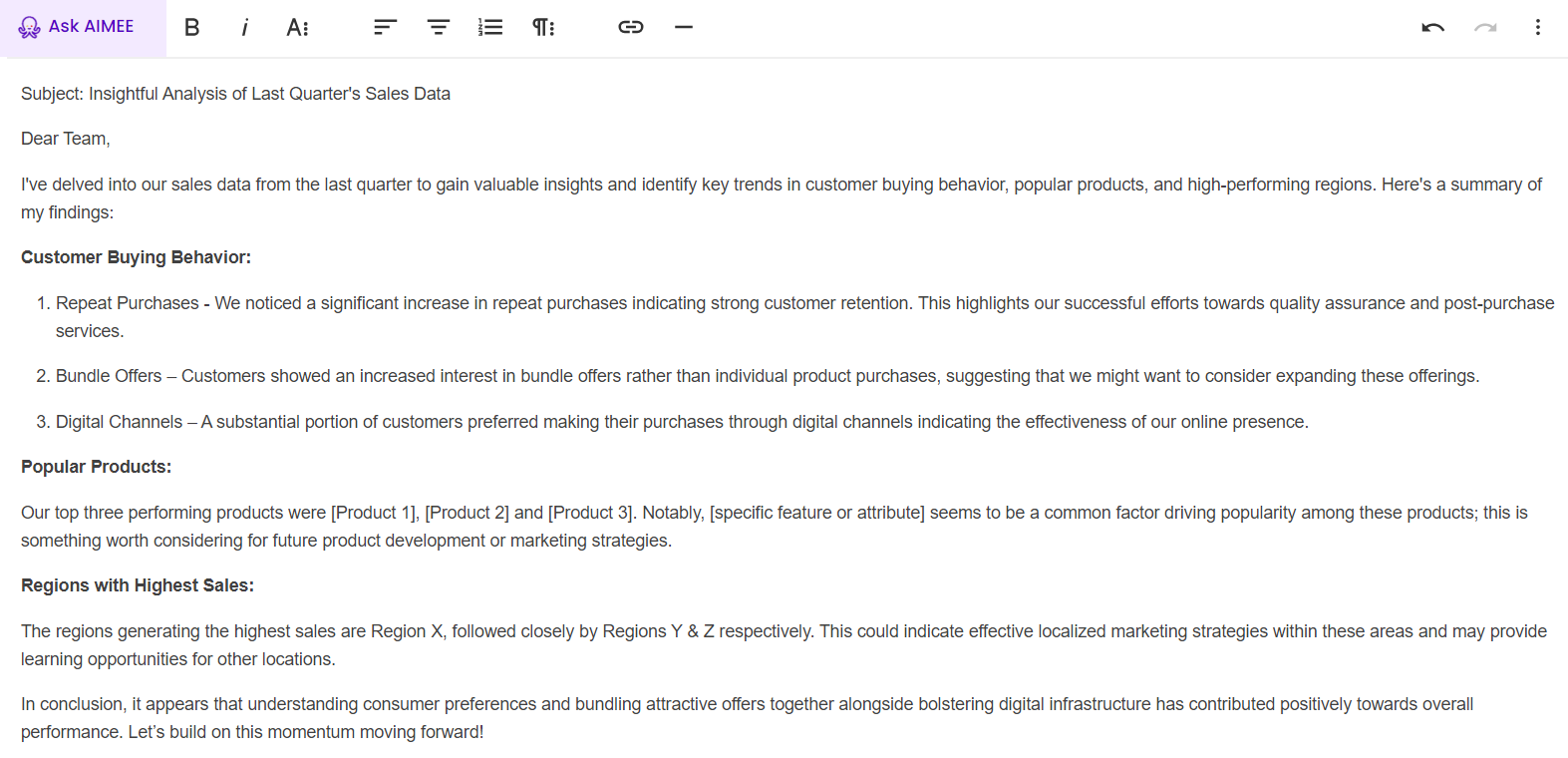
Subscribe to BrandWell today and train your sales teams how to use AIMEE for writing sales reports, ad copy, sales proposals, lead generation emails, product descriptions, and more.
The Future of Sales Forecasting and Pipeline Analysis
The arrival of artificial intelligence has transformed the art of sales forecasting, providing sales teams with a powerful tool for predicting and optimizing the sales process.
Sales forecasts have always been crucial for business leaders to make informed decisions. Yet traditional methods often miss the mark due to human bias or insufficient data analysis. This is where AI steps in.
An effective AI tool can take on tasks such as contact capture, activity mapping, and CRM data entry — traditionally time-consuming tasks for sales reps — with speed and accuracy that humans simply cannot match.
This kind of automation allows your team more time spent on closing deals rather than administrative workloads. Advanced AI solutions can totally eliminate manual CRM data entry while capturing all relevant customer interactions.
Predictive analytics plays a pivotal role in modernizing our approach toward pipeline analysis too. Instead of relying solely upon historical performance metrics as most conventional systems do, machine learning tools can extract valuable insights even from unstructured data types.
Not only does this improve sales forecasting accuracy, but it also aids in lead prioritization by identifying key patterns and trends that could potentially signal high-value prospects – a massive boost for any sales team’s performance.
Essentially, embracing AI in sales is not merely about altering our methods. It’s about elevating job satisfaction and boosting efficiency at the same time. As an increasing number of businesses incorporate AI into their operations, we can expect a future that’s promising and precise.
FAQs – How Can I Use AI in Sales
How can AI be used in sales?
AI helps streamline the sales process by automating routine tasks, providing data insights, and enhancing customer interactions.
How to use Gen AI in sales?
You can use Generative AI for predictive analytics, lead scoring, or forecasting trends to optimize your sales strategy.
What is the AI sales strategy?
An AI-driven strategy leverages advanced tech tools to analyze data, automate repetitive work, and provide valuable insight for decision-making in a dynamic market environment.
Can sales be replaced by AI?
No. While it enhances efficiency and productivity significantly, human touchpoints are still crucial in any successful sales interaction.
Conclusion
The power of automation is undeniable. Freeing up your sales team’s time to focus on strategic tasks rather than getting bogged down with administrative work can skyrocket sales efficiency and productivity.
Advanced data enrichment tools are not just fancy add-ons; they’re game-changers! Unearthing insights that lead to smarter decisions and better outcomes.
Talk about conversation intelligence tools, these babies take customer interactions to new heights. More personalized, more effective — it’s how you win customers over!
Sales enablement automation isn’t just streamlining processes; it’s transforming them entirely – think speedier transactions and smoother operations all around.
Making data-driven decisions isn’t an option anymore but a necessity in today’s digital age. Trust AI to guide you there by sifting through large datasets like a pro so you can close deals faster than ever before.
Take the first step to sales automation by signing up for BrandWell and discover the power of generative AI!